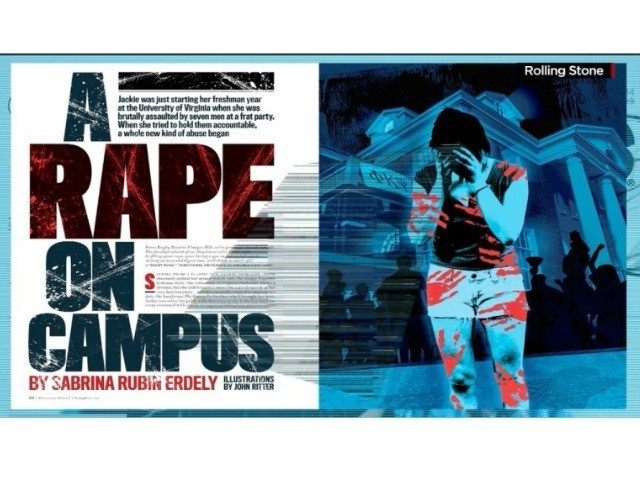As the report on Rolling Stone‘s (RS) journalistic fiasco makes clear, author Sabrina Rubin Erdely and Rolling Stone‘s editors failed to do the right—and professionally appropriate thing—time after time. Had they done anything akin to due diligence, the now-retracted mess of a story would never have seen the light of day, let alone have been enshrined in print.
Erdely’s reporting records and interviews with participants make clear that the magazine did not pursue important reporting paths even when Jackie had made no request that they refrain. The editors made judgments about attribution, fact-checking and verification that greatly increased their risks of error but had little or nothing to do with protecting Jackie’s position.
From the scathing report, “if (Rolling Stone) had given the fraternity a chance to review the allegations in detail, the factual discrepancies the fraternity would likely have reported might have led Erdely and her editors to try to verify Jackie’s account more thoroughly.”
That never happened, and while Rolling Stone actually tries to shift blame somewhat to Jackie, as the report also stipulates, RS can’t blame demands from Jackie for their incredible and repeated failures. The passage below not only makes that clear, their own source Jackie even suggested an alternate method for Erdely to identify the alleged central figure in the alleged gang rape, and Erdely along with her editors, not Jackie, dropped the ball.
Jackie sounded shocked, according to Erdely’s notes. “I don’t want to be the one to give you the name,” Jackie said.
“How else do you suggest I find it out?”
“I guess you could ask Phi Psi for their list,” Jackie suggested.
After this conversation, Jackie stopped responding to Erdely’s calls and messages. “There was a point in which she disappeared for about two weeks,” Erdely said, “and we became very concerned” about Jackie’s well-being. “Her behavior seemed consistent with a victim of trauma.”
Yet Jackie made no demand that Rolling Stone not try to identify the lifeguard independently. She even suggested a way to do so – by checking the fraternity’s roster. Nor did she condition her participation in the story on Erdely agreeing not to try to identify the lifeguard.
In some ways, the report seems far too forgiving when it comes to Erdely, at one point citing an activist source who says Erdely “was very aggressive about contacting” the accused. Yet, the following passage makes it clear that’s simply not true.
With the benefit of hindsight, to succeed, Erdely probably would have had to persuade students to access the aquatic center’s employment records, to find possible name matches. That might have taken time and luck.
In essence, she passed on the very thing Jackie suggested she do.
Erdely also failed to provide the fraternity with enough detail for them to even investigate the matter, while demanding an on-the-record response. Instead, she assumed they had the same details from a University of Virginia report—but failed to verify that. Had she done so, again, her disaster dressed up as journalism likely would have never been published.
Last October, as she was finishing her story, Erdely emailed Stephen Scipione, Phi Kappa Psi’s local chapter president. “I’ve become aware of allegations of gang rape that have been made against the UVA chapter of Phi Kappa Psi,” Erdely wrote. “Can you comment on those allegations?”
It was a decidedly truncated version of the facts that Erdely believed she had in hand. She did not reveal Jackie’s account of the date of the attack. She did not reveal that Jackie said Phi Kappa Psi had hosted a “date function” that night, that prospective pledges were present or that the man who allegedly orchestrated the attack was a Phi Kappa Psi member who was also a lifeguard at the university aquatic center. Jackie had made no request that she refrain from providing such details to the fraternity.
The university’s administration had recently informed Phi Kappa Psi that it had received an account of a sexual assault at the fraternity that had reportedly taken place in September 2012. Erdely knew that the fraternity had received a briefing from UVA but did not know its specific contents. In fact, in this briefing, Scipione said in a recent interview, UVA provided a mid-September date as the night of the assault – not Sept. 28. And the briefing did not contain the details that Jackie had provided Erdely. The university said only that according to the account it had received, a freshman woman had been drinking at a party, had gone upstairs and had been forced to have oral sex with multiple men.
What Erdely did, as described above, reads more like how to do a hatchet job, or run an inquisition, than conduct anything akin to an act of journalism. That Erdely is being allowed to slink away, while remaining an RS contributor, suggests that neither she nor Rolling Stone have learned anything from this sad affair.

COMMENTS
Please let us know if you're having issues with commenting.